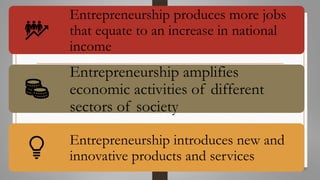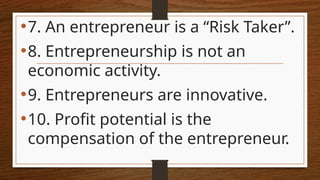w1-imntroduction entrepreneurship-grade-12
- 2. Entrepreneurship ŌĆó A proactive process of developing a business venture to make a profit. ŌĆó The word ŌĆ£entrepreneurŌĆØ was derived from the French verb entre prendre, which means ŌĆ£to undertake.ŌĆØ ŌĆó The enterprise is created by an entrepreneur and the process is called ŌĆ£EntrepreneurshipŌĆØ.
- 3. Societal and Economic Benefits of Entrepreneur
- 4. Entrepreneurship produces more jobs that equate to an increase in national income Entrepreneurship amplifies economic activities of different sectors of society Entrepreneurship introduces new and innovative products and services
- 5. Entrepreneurship improves peopleŌĆÖs living standards Entrepreneurship disperses economic owner and creates equality Entrepreneurship reduces social conflicts and political unrest Entrepreneurship elicits economic independence and capital information
- 6. Who is an Entrepreneurs? Unique individual who has the innate ability and extraordinary dedication to establish and manage a business, acknowledging all the risk and reaping its reward Entrepreneurs are innovators. They are willing to take the risks and generate unique ideas that can provide profitable solutions to the needs of the market and the society
- 7. Self Employed The Manager The Leader The Investors The True Entrepreneur
- 8. Instruction: Read the statements carefully then write True if the statement is correct & write False if you think the statement is not correct
- 9. ŌĆó1. Entrepreneur means ŌĆ£to undertake.ŌĆØ ŌĆó2. Entrepreneurship is a process of actions of an entrepreneur who is always in search of opportunities. ŌĆó3. The greatest significance of entrepreneurship is to help identify and develop the managerial capabilities of entrepreneurs.
- 10. ŌĆó4. Entrepreneurship will lead to the creation of organizations. ŌĆó5. Entrepreneurship can improve the life of the entrepreneur only. ŌĆó6. Coward people will become successful entrepreneurs.
- 11. ŌĆó7. An entrepreneur is a ŌĆ£Risk TakerŌĆØ. ŌĆó8. Entrepreneurship is not an economic activity. ŌĆó9. Entrepreneurs are innovative. ŌĆó10. Profit potential is the compensation of the entrepreneur.
- 12. ŌĆó 1. T ŌĆó 2. T ŌĆó 3. T ŌĆó 4. T ŌĆó 5. F ŌĆó 6. F ŌĆó 7. T ŌĆó 8. F ŌĆó 9. T ŌĆó 10. T
- 13. RELEVANCE OF ENTREPRENEURSHIP TO AN ORGANIZATION 1. Development of Managerial Capabilities - this means that one of the benefits an entrepreneur gets is to develop his managerial skills. 2. Creation of Organizations - which means that because of entrepreneurship many organizations will exist.
- 14. RELEVANCE OF ENTREPRENEURSHIP TO AN ORGANIZATION 3. Improving Standard of Living - this means that entrepreneurship can lift up the economic status of an individual. 4. Means of Economic Development - this means that not only the life of the entrepreneur is improved but also the society where the business is located.
- 15. Factors Affecting Entrepreneurship ŌĆó1. Personality Factors which include: ŌĆóa. Initiative - doing things even before being told. ŌĆób. Proactive - which means he can classify opportunities and seize it. ŌĆóc. Problem Solver - which means he can retain good relations with other people.
- 16. Factors Affecting Entrepreneurship ŌĆó d. Perseverance - meaning he will pursue things to get done regardless of challenges. ŌĆó e. Persuasion - means that he can entice people to buy even if they donŌĆÖt want to. ŌĆó f. A Planner - he makes plans before doing things and does not fail to monitor it. ŌĆó g. Risk-taker - which means that he is willing to gamble but he will calculate it first
- 17. 2. Environmental Factors which include political, climate, legal system, economic and social conditions and market situations
- 18. Common Competencies in Entrepreneurship 1. Decisive - an entrepreneur must be firm in making decisions. 2. Communicator - an entrepreneur must have a convincing power. 3. Leader - an entrepreneur must have the charisma to be obeyed by his employees. 4. Opportunity seeker - an entrepreneur must have the ability to be the first to see business chances.
- 19. 5. Proactive ŌĆō an entrepreneur can control a situation by making things happen or by preparing for possible future problems. 6. Risk Taker ŌĆō an entrepreneur has the courage to pursue business ideas. 7. Innovative - the entrepreneur has big business ideas and he does not stop improving and thinking of new worthwhile ideas for his business.
- 20. Core Competencies in Entrepreneurship 1. Economic and Dynamic Activity - Entrepreneurship is an economic activity because it involves the creation and operation of an enterprise with a view to creating value or wealth by ensuring optimum utilization of limited resources. 2. Innovative ŌĆō The entrepreneur constantly looks for new ideas, thus he needs to be creative.
- 21. 3. Profit Potential - The entrepreneur can be compensated by his profit coming from the operation. 4. Risk bearing ŌĆō The entrepreneur needs to gamble but wise enough to offset the risk.
- 22. Types of Entrepreneurs 1. Innovative Entrepreneurs - They are those who always make new things by thinking of new ideas. They have the ability to think newer, better and more economical ideas. 2. Imitating Entrepreneurs - They are those who donŌĆÖt create new things but only follow the ideas of other entrepreneurs. 3. Fabian Entrepreneurs - They are skeptical about changes to be made in the organization. They donŌĆÖt initiate but follow only after they are satisfied.
- 23. 4. Drone Entrepreneurs - They are those who live on the labor of others. They are die-hard conservatives even ready to suffer the loss of business. 5. Social Entrepreneurs - They are those who initiate changes and drive social innovation and transformation in the various fields such as education, health, human rights, environment and enterprise development.
- 24. Career Opportunities of Entrepreneurship 1. Business Consultant - with the expertise of in the field of entrepreneurship, he can be a very good source of advices to other entrepreneurs and would be business men. 2. Teacher - a graduate of an entrepreneurship can use his knowledge in teaching. 3. Researcher - the entrepreneur can be employed as a researcher by an enterprise. 4. Sales - the entrepreneurship graduate can apply as a salesman. 5. Business Reporter - the entrepreneur being expert in the field, can be employed as a business reporter.
- 25. Activity 4. Interview the Known ŌĆóChoose three successful entrepreneurs in your community or nearby places and conduct an interview using the guide questions below. Discuss the result of your interview to your teacher.
- 26. ŌĆó1. What motivated you to become an entrepreneur? ŌĆó2. What do you think are your characteristics and competencies that made you a successful entrepreneur? ŌĆó3. What do you think of being employed? Why you did not choose that path?
- 27. Activity 5. Research Me ŌĆóResearch on the life story of at least three (3) entrepreneurs in your locality; identify how they started their business. Ask how much was their start-up capital.



























